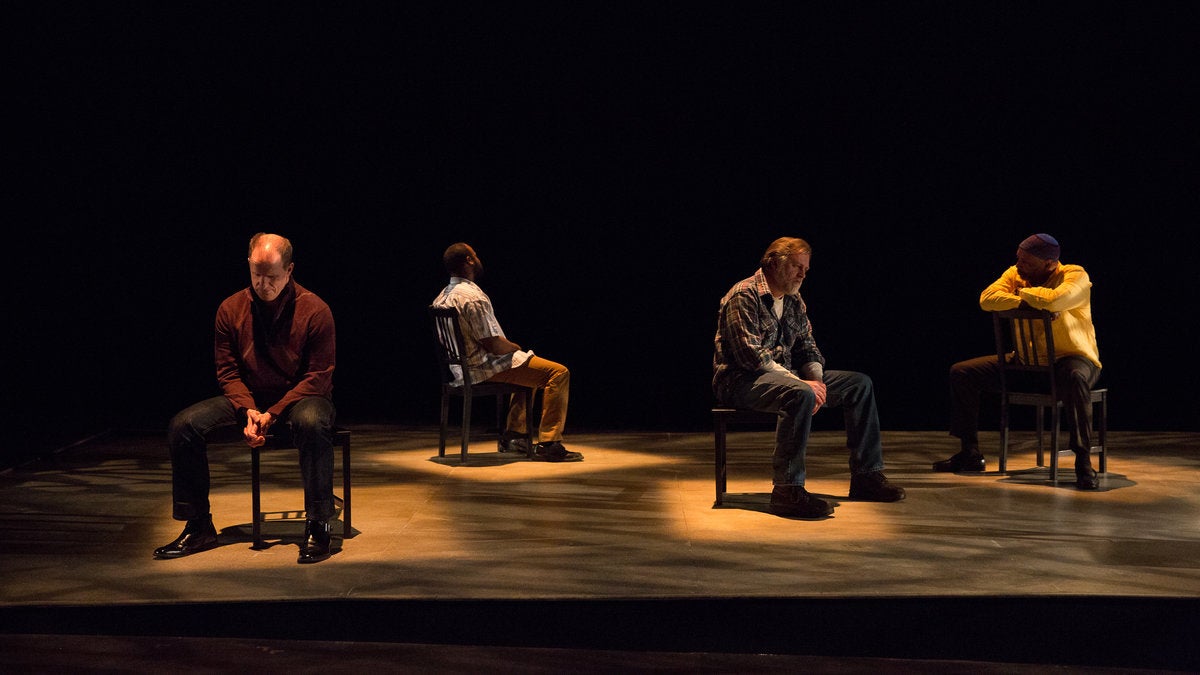Review: On stage and off, the real lives of ‘The Exonerated’

From left, Tony Lawton, Akeem Davis, William Zielinski and David Alan Anderson as four of the six death-row prisoners freed in "The Exonerated," at Delaware Theatre Company in Wilmington. (Photo courtesy of Matt Urban/Mobius New Media)
“The Exonerated,” a finely crafted piece of docu-drama theater in a terrific production at Delaware Theatre Company, is fresh as today’s news. It’s about innocent people who, for all sorts of reasons they couldn’t have imagined, are charged with murder and end up on death row. Specifically, it’s about six of them, all in different cases, who are now free
Talk about theater that mirrors life: Only Thursday, lawyers for the City of New York announced that a man named David Ranta would get a $6.3 million settlement from the city for a wrongful conviction in the 1990 murder of a Hasidic rabbi in Brooklyn. Ranta spent 23 of his 58 years in prison. The city is investigating a detective who’s been accused of fabricating confessions and coercing witnesses in Ranta’s case and possibly in others, according to the New York Times.
Ranta is lucky – if we can define luck in a loose way – because he was able to sue. That’s a relatively new idea; 29 states permit the exonerated to seek compensation, the Times reports.
The National Registry of Exonerations, a project of two law schools, reports that as of Monday, 1,317 prisoners have been exonerated of crimes in the United States during the past 25 years. Its Web site lists each, and details the cases and the errors or procedural nightmares that sent these people to prison. No one in the public eye has ever insisted, to my knowledge, that the American system (or probably any system) of justice is perfect. But a lot of people insist that we can improve it.
One of the ways is by challenging the most inexorable dimension of the justice system: executions. Without a soapbox or even a direct author’s message from Jessica Blank and Erik Jensen, the two playwrights who researched and wrote “The Exonerated,” the play does just that, using the unassailable facts of these six cases.
But don’t dismiss “The Exonerated” as agitprop theater – the sort of play with a liberal bent meant to drive an audience to action, a form of theater common in Europe, then America, mostly during the first half of the 20th century. “The Exonerated” goes beyond labels like liberal, conservative, or independent and that’s the play’s triumph – it’s impossible to politicize hard fact. The lack, or suppression, of fact is what put these people behind bars. The discovery of it, far too late, is what set them free.
Those facts are the recipe for a super-heady 90 minutes of theater, but there’s more – “The Exonerated” is composed of dialogues and monologues filled with irony, self-doubt and humor and in the end, it has an oddly pleasant appeal. (Even as it goes on perhaps 10 minutes too long in its lead-up to the stories of being set free.) Some of its appeal comes from the play itself, some from an A-list local cast that delivers the characters organically, as if we were the ones who asked to meet them and they were obliging without question or motive.
The director, David Bradley, long associated with People’s Light in Malvern, puts this production together in Delaware at the same time that a State Senate bill to strike down the death penalty sits, without action, in a House committee in the state capital. Meaningful theater is what some audience members would define as theater, but it also has to work on stage, and Bradley puts “The Exonerated” on a mostly bare two levels and moves the six defendants and other characters constantly as they address us directly and slip into little scenes from their interrogations, prison days or current lives.
The effect of Bradley’s staging is like that of a documentary film: we shift from scene to scene in quick shots that sweep us directly into the stories the characters tell. (For the record, my family and Bradley and his family are longtime friends. To respect each other’s professional roles, we’ve never spoken together about this play or production, even now as I write.) Bradley is aided greatly by Yoshi Tanokura’s spare scenic design, which angles one stage atop another and uses a blank rectangle of jutting wall as background, and precise lighting and sound by Shon Causer and Mike Hahn, respectively.
The acting team is superb – I can’t shout out to any one of them because the excellence of one is equaled by the others in roles both large and supporting. If you add up the Philadelphia-area stages that Frank X, Tony Lawton, Susan Riley Stevens, Megan Bellwoar, Dan Hodge, Akeem Davis, William Zielinski and more recently, Aimé Donna Kelly have trod, you grasp the long reach of professional theater here. Add David Alan Anderson and Tom Byrn, who’ve performed in the region during busy traveling actors’ careers, and the cast is complete.
They bring their characters alive – and for the six who play the exonerated among them, in real life these characters were able to remain alive only in a hard-fought reversal of fortunes. (One of them was in the audience on opening night Saturday and after the curtain call, came to the stage with a more recent exoneree.) You could watch hours and hours of reality TV, and never see anything that comes close to the reality of “The Exonerated.”
_“The Exonerated” runs through March 9 at Delaware Theatre Company, 200 Water St. in Wilmington. 302-594-1100 or www.delawaretheatre.org.
WHYY is your source for fact-based, in-depth journalism and information. As a nonprofit organization, we rely on financial support from readers like you. Please give today.




